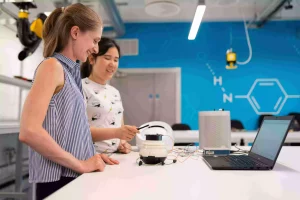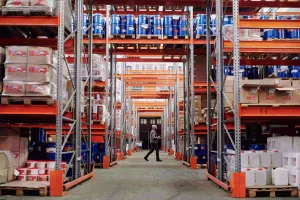What is quality control
Quality control is a rigorous process in which a product’s quality is tested, inspected, and certified to determine whether it meets all quality standards specified by the company or regulatory bodies. A well-defined quality control procedure helps identify quality issues at the source and take corrective measures proactively. Quality control inspectors perform a number of tests at various stages in the quality manufacturing process, from raw materials to finished products. In addition to earning customer satisfaction, it also helps achieve a zero-waste supply chain for the company.

What are 4 types of quality control inspections?
Initial production inspection (IPI) is the first quality control checkpoint. It takes place before the manufacturing begins. This type of inspection helps to ensure that the raw materials of the products conform to the specifications and are of good quality. This gives the manufacturers a second chance to identify product quality issues and take corrective actions before going to large-scale production.
During Production Inspection (DPI) is used to inspect products during manufacturing. Typically, DPI is performed when 10-15% of the products are manufactured. This type of inspection helps to ensure that the products are being made correctly and all the defects are identified, corrected, rechecked and reported. As a result, it helps reduce delays and costly reworks down the line.
This quality inspection is performed when at least 80% of the products are manufactured and packed for shipment. PSI helps to ensure that the products are compliant and meet all the quality requirements specified by the buyer.
Container loading inspection is used to inspect products before/after they are loaded into containers. This type of inspection helps to ensure that the products are properly packaged and protected from damage during shipping.
6 reasons why quality control is important for you

For any importer, quality control is a critical step to ensure the products can pass all the strict quality requirements, compliant with the customs and can satisfy the end-user. If not done correctly, it can wreak havoc across the supply chain and cause monetary and non-monetary damages to the brand or retailer. Here are 6 reasons why quality control is important for you:
Protecting your reputation
Remember the Samsung Note 7 fiasco in 2016? Samsung had to recall 2.5 million units of its flagship phone after complaints of exploding batteries. According to experts, this recall is thought to have cost $5.3 billion. Now imagine the PR disaster this iPhone rival flagship phone caused and affected the brand in the following years.
Meeting regulatory requirements
No matter how big or small an importer you are, you need to meet certain export compliances. Just in case you fail to do so, it will result in penalties for the violation. To avoid such situations, you may need to rely on a third-party quality control service provider who is well-versed with the customs laws and requirements.
Avoiding costly rework and recalls
Quality control issues are inevitable. For instance, missing out to detect a certain defect early in the Initial production Inspection (IPI) and not taking corrective measures will cost you 10 times more money than resolving the quality issues in the following production stage. Faulty air-bag inflators Takata was held responsible for at least 20 deaths as the inflations would explore and throw sharp objects at the passengers. This is the biggest recall in history which cost $24 billion; leading the brand to bankruptcy.
Managing your suppliers
Working with overseas suppliers can be tricky. Even if they are 100% committed to providing you with the highest quality products, they might still ignore or skip quality issues. In addition to causing costly recall and rework, it might also result in shipment delays. Having an independent quality control service provider in place can give you a fresh perspective on the production and shipment progress, and help identify, classify and report defects and thus, better manage your suppliers.
Reducing your quality risks
Low-quality products can put your brand and its reputation at stake. However, by identifying and analyzing defects pattern, you can prevent the reoccurrence of product failure in the future.
Maintaining a competitive edge
Quality inspections can help you cut your production costs, achieve supply chain efficiency and provide more ‘value’ to your customers than your competitors.
A complete quality control inspection guide
QC is not just something that happens at the end of the production process. It is an ongoing process that should be happening throughout the entire production process. This means that every step of the way, from raw materials to finished products, should be checked for quality. In this section, we will divide the quality control procedures into 4 parts and walk you through each of them step-by-step:
Incoming quality control (IPC)
Incoming quality control, also known as IPC is the first step in the quality control process. It takes place before the production begins. Quality control inspectors check raw materials, identify quality issues and report them so that corrective actions can be taken immediately.
In-process quality control (IPQC)
During the In-process quality control (IPQC), a quality controller performs random quality inspections to evaluate operation method, handling procedures, tools security, environmental control plan etc. It allows the inspector to identify defects or quality issues, and suggest improvements so that the product quality passes all the requirements.
Final Quality Check (FQC)
Final Quality (FQC) takes place when all the products are manufactured and ready to be packed. In this quality control checkpoint, the quality control inspectors check the products on a few criteria such as:
- Product specification check
- Appearance check
- On-site and offsite inspections
- Classification of defects
Outgoing quality control (OQC)
Also known as Pre-shipment inspection, this is the last step in the quality control process. The purpose of performing Outgoing quality control (OQC) is to ensure the shipment is defect free. During this on-site inspection, a quality controller checks;
- Packaging
- Quantity verification
- Markings & labels verification
- Product quality conformance
- Functionality and safety test
- Workmanship check
Based on the findings, the quality controller prepares a detailed inspection report within 24 hours and sends it back to the importer.
Why Tetra Inspection is a perfect choice for your quality control needs
Tetra Inspection is an accredited quality control services provider operating in 25 countries across Asia, Europe, and Africa. We pride ourselves on working with a network of 200 best-in-the-business quality controllers who are well-versed with the internationally recognized sampling standards and up to date with the latest customs regulations. We come trusted by global brands such as Delsey, Bauer, Target and Babolat for one-stop quality control solutions. For more information, please contact us.
Conclusion
Quality control is crucial for any business outsourcing overseas as it helps them maintain a competitive edge and prevents the reoccurrence of product failure. By identifying and analyzing defect patterns, businesses can improve their manufacturing process and provide more value to their customers. Quality control inspections also help businesses cut their production costs and achieve efficiency.


